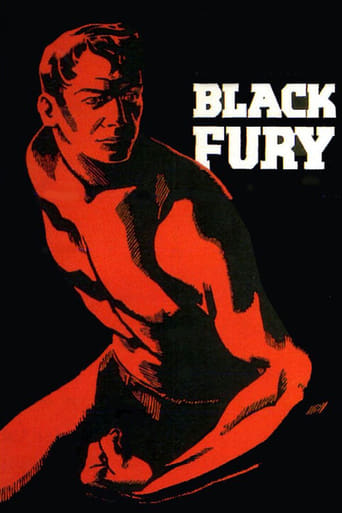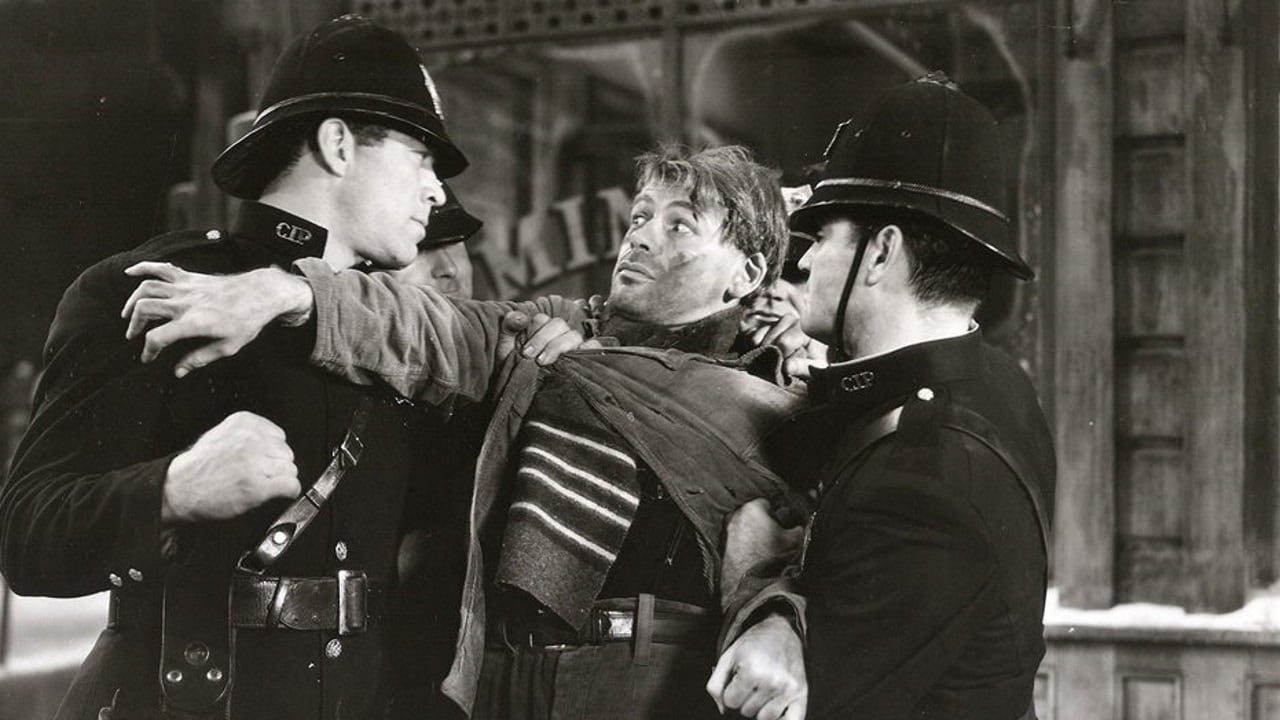bkoganbing
During the Thirties Warner Brothers had the reputation of being the working class studio and it was films like Black Fury that made for Warner Brothers that reputation. It was rare indeed to see another studio take stories about ordinary working people. Mostly they concentrated on the middle and upper classes because film was a form of escapism during the Depression. Black Fury coming out as it did in the middle of the New Deal was a timely reminder of the difficulties organized labor faced. Not coincidentally 1935 was the year that the Wagner Labor Relations Act was passed, an effort finally by the government to give labor some kind of equal footing with management. The need of the Wagner Act was to correct some of the abuses shown in films like Black Fury.Paul Muni plays happy go lucky immigrant coal miner Joe Radek. A man admittedly who works hard and no one thinks of as any kind of brain. He gets used good and proper by the company to stir up the miners so they will strike and give the company an excuse to lock out the union and bring in scabs.What you see with those miners living on subsistent wages in company towns was taken right from current headlines. It may be ancient history to us now, but it was very real for those people back in the day. The Pinkertons as represented by brutal and corrupt company policeman Barton MacLane had an unsavory reputation as strikebreakers and enforcers for management. That too is no exaggeration. Muni, aided and abetted by former girl friend Karen Morley now seeing the error of some of her ways, sees what a chump he's been and takes some real direct action against the employers. It's spectacular I'll tell you that.Though his acting style seems to have not worn well with some, not with me mind you, Muni was given a really rare tribute that year. His performance as Joe Radek was the second time a performer had a sustained write-in campaign for him for an acting Oscar. He finished second in the balloting to Victor McLaglen for The Informer and ahead of Mutiny of the Bounty nominees, Clark Gable, Charles Laughton, and Franchot Tone. The following year the Academy banned write-ins and that's been so ever since. Of course the following year Muni won his Oscar for The Story of Louis Pasteur.We've moved on in America from an industrial to an information based society and films like Black Fury are now part of history. But it's a history we should not forget.
marcslope
Paul Muni, David Thomson once wrote, was the '30s' idea of a great actor: He never looked the same twice. Here he's a hail-fellow-well-met Eastern European immigrant coal miner in a dreary Pennsylvania burg, deceived by union busters and weighed down by a ten-ton accent. Indeed the screenplay seldom rises above a fifth-grade literacy level, the better to illustrate the goodheartedness of these poor but honest laborers. But five minutes of Muni, and you've seen the whole performance -- a Zorba-the-miner "life force" who yells all his lines and sounds unfortunately like Steve Martin's wild-and-crazy-guy character from Saturday Night Live in the '70s.Warners does come up with a convincingly grimy set and a capable stock-company supporting cast, but the dramaturgy is connect-the-dots. One miner shouts and sways the whole crowd, then another, then another -- what a gullible bunch this must be. The evil cops and management figures are so absurdly evil that nuance is lost. The third act does whip up to an exciting blow-up-the-mine climax, but then it's resolved in headline montages, as if Warners suddenly ran out of money, or film. And Michael Curtiz -- I didn't think this fine director was capable of this -- stages the crowd scenes clumsily, shifting point of view confusingly and slapping the mise-en-scene together hard, with loud music. Certainly the studio is on the side of the angels, arguing for a fair day's pay for a fair day's work, and as a '30s sociological curio the movie is not without interest. But Muni's monotonous bluster and an elementary script combine to create a cinematic cave-in.
howdymax
This is one dreary movie. It reminds one of the images conjured up in Upton Sinclair's "Jungle". The art direction is very much early Warner Bros with emphasis on dirt and grime.It has to do with the personal descent of an ignorant bohunk miner in Coaltown. His girl runs off with a company cop, he's conned by an agitator into sabotaging the union, and when he's finally on his own personal skids, his best friend is beat to death by the goons. Geez, whatever you do, don't watch this if you're depressed. After what seems like a lifetime of self loathing, he is redeemed. His girl comes home, he avenges his best friend, and all is right with the world. Dreck.Try to imagine Paul Muni's natural accent enhanced by an affected Eastern European accent. The result sounds like Yiddish with a mouth full of marbles. Add to that his over the top acting and plenty of dirt. The usually agreeable Karen Morley just looks depressed and bored. If I were in this movie, I would be depressed and bored. The only stand out in the movie is the irrepressible Barton MacLane. I think he is one of the few actors that would have been able to get through this without some kind of medication. Of course he gets his in the end.I have the greatest respect for Michael Curtiz. In my opinion, he is one of a small club of truly gifted directors - despite his brutal reputation. He was able to create some really memorable stuff. Historical costume epics, mysteries, human dramas, and anything else they threw at him. He has never disappointed me - until now.
F Gwynplaine MacIntyre
In 'Black Fury', Paul Muni gives one of his best performances, and also appears on screen in one of his more plausible make-ups. This time he plays a Slavic immigrant, uneducated but keenly intelligent, working in an American coal mine. Muni's hair is dyed blond, yet looks realistic, and his own Eastern European facial features work with this characterisation ... not against it, as they did for some of his other roles. The film also features a fine performance from John Qualen, a prolific character actor whose film appearances were often marred by unconvincing and unnecessary foreign accents of the "yumpin' yiminy!" sort. In 'Black Fury', Qualen's flavour-of-the-month accent is less obtrusive than usual, and it actually works for the character he plays: a Polish-American miner.Joe Radek (Muni) is a miner in a 'company town', where all the labourers are poorly-paid and live in squalid shanties. Radek and his fellow miners work in extremely dangerous conditions. The company that owns the mine also owns all the local businesses, and the local police force also work for the mining company. The cops have no interest in justice: they're bullies whose only concern is to keep the locals quiet and subservient to the company. The head cop is a slimy sadist named McGee, well-played by Barton MacLane. Radek's buddy Shemanski (Qualen) gets drunk one night and makes the mistake of criticising company policy: staggering home that night, he has a fatal 'accident' arranged by McGee's goons.To call attention to various grievances, Radek fills the mineshaft with dynamite. He packs several days' worth of food for himself, then he takes McGee hostage at gunpoint and brings him into the mine. Radek chains McGee to the pit face, slightly out of reach of Radek's food supply. If Radek's demands aren't met, he's going to blow up the mine ... with himself and McGee inside. After they've been in the mine for several days, there's one harrowing shot of the starving McGee chained to the wall, begging Radek for food. The film ends with one of those slam-bang action climaxes that Warner Bros did so well, spiced with some social commentary that doesn't get too preachy.The film boasts an excellent supporting cast, filled with actors who are (mostly) more obscure than usual, which helps us to immerse ourselves in the action. Karen Morley, quietly beautiful, gives a fine performance, and Michael Curtiz (a very underrated director) does his usual superlative work.'Black Fury' is based on a story by Michael A. Musmanno, a Pennsylvania lawyer of Italian descent. Late in his life, Musmanno devoted several decades to writing a book called 'Columbus *WAS* First' (his emphasis), which purported to prove that no European explorers reached the Americas before Columbus. Musmanno's claims for Columbus have long since been disproven, but 'Black Fury' is an excellent film. I'll rate this movie 9 points out of 10.Trivia note: Shortly after this movie was released, Warner Brothers released a Loony Toon starring Porky Pig as a hunter who had a dog named Black Fury. What a shameless plug!



 AD
AD


